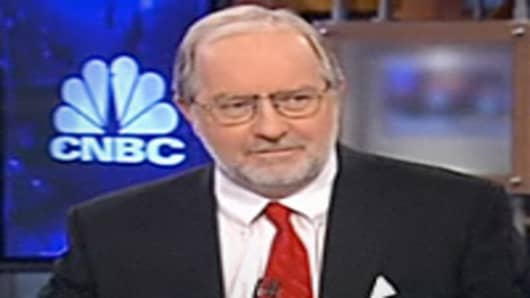"When the music stops,everybody dashes to find a seat and many people get left behind. Now you have a lot of people scrambling to find a seat," he said. "It is always astonishing to me, after decades in the business, to understand how the psychology can change so quickly — it almost leaves you gasping for air."
(Read More: Stock Market's Three-Year Rally Has Fed to Thank)
Asian stock markets saw a big sell-off on Thursday and European markets look set to follow suit, opening sharply lower. Gartman told CNBC that investors looking back at market movements around the world after the minutes were published, would see them as a shift of the "tectonic plates shifted beneath our feet" though he denied that risk aversion would mean that investors would rush to buy "safe-haven" assets, such as gold.
(Read More: Gold Hits 7-Month Low on Fate of Fed's Stimulus)
"The gold trade isn't coming back for a while," he said. "You'll get a bounce…but the bounce will be on very light volume and it'll be short-lived. … Even if there's a bounce of $15 to $20 for gold, I'll be surprised," he said. "There are plenty of people with positions that have to be liquidated, and as I like to say, the margin clerks have their pencils in hand and are ready to sell on any rally."
Hold Fire on Stocks
Not everyone believes a big sell-off is coming, with European strategists telling CNBC that investors should hold back from selling European stocks that have rallied.
(Read More: CEOs Say Europe's Recovery on Track)
Peter Oppenheimer, European equities strategist at Goldman Sachs, told CNBC that the prospects for attractively valued equities are still "very good."
"It's not that surprising we're seeing a bit of a setback. We moved to a neutral position from an overweight for a three-month view on equities a month or so ago as we thought that the very sharp rise we'd seen in equities had moved a little bit ahead of the fundamentals," Oppenheimer told CNBC's "Worldwide Exchange."
He recommended investors with a view of twelve months or beyond should buy into the current weakness.
On Thursday morning, economic data from the euro zone missed analysts' expectations of a turnaround for the region. February's Flash Composite PMI came in at 47.3, lower than January's number of 48.6 and below expectations of 49.0, according to a Reuters poll.
Despite the figures, Oppenheimer said European stocks would move higher, supported by attractive valuations, "accommodative" central bank policies, strong corporate balance sheets and a recovery for the world economy, which would speed up this year and into 2014.
(Read More: European Stocks Could Correct Up to 20 %: Faber)
Ian Harnett, an European strategist at Absolute Strategy, said the equity sell-off was normal and there were reason for optimism.
"We've just had a fantastic market run in European equities — almost 10 percent over the last three months — it's very difficult to sustain that so I suspect we'd have a little bit of pushback," he said. "But if we look further out to next year, we're still very positive that equities as a whole will do well and Europe, within that, will be one of the best-performing areas."





